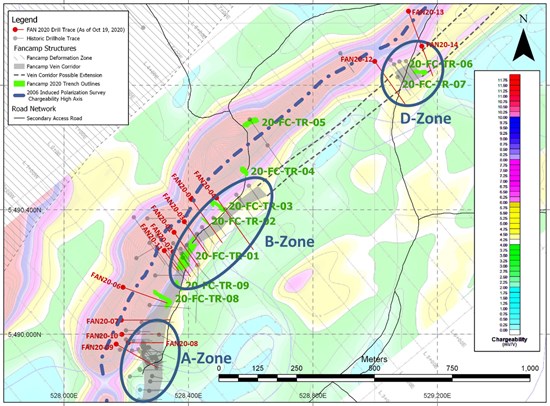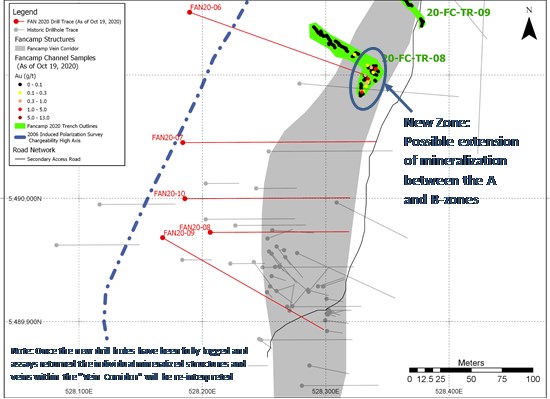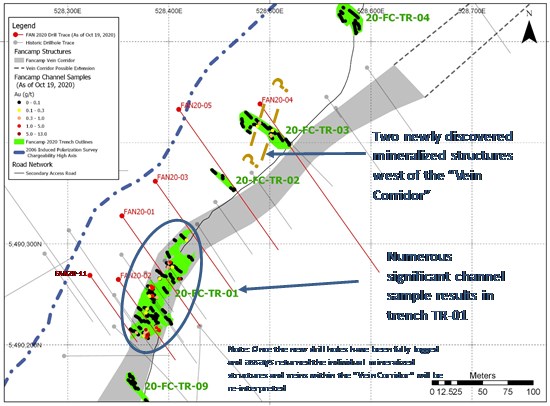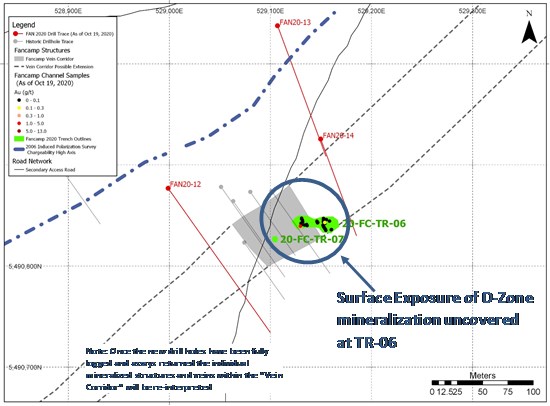Blue Thunder Reports Encouraging Gold Values from Initial Trenching, Including 10.98 g/t Gold Over 1.0 m at Fancamp
Toronto, Ontario–(Newsfile Corp. – October 21, 2020) – Blue Thunder Mining Inc. (TSXV: BLUE) (“Blue Thunder” or “the Company”) is pleased to provide initial trench sampling results from the 2020 exploration program at its 51,000-hectare Muus Gold Project (the “Project”), which comprises five non-contiguous claim blocks (“Fancamp”, “Muus”, “Muus East”, “Nisk” and “Embry”) near Chibougamau, QC.
“We are extremely pleased with the progress made by our exploration team at Fancamp. The program of surface trenching and channel sampling has successfully expanded the footprint of the known vein trend and returned several notable gold assay results in these new vein exposures. We have also completed our inaugural diamond drilling program at Fancamp and are preparing for ground geophysical surveys, in anticipation of upcoming drilling at Muus. So far, our work has been completed close to both schedule and budget. Although the drill core assay results are pending, we have received most of the surface trench gold assays and are very encouraged by the results. Fancamp is our first of many high-priority targets that we will evaluate during this and future phases of exploration as we advance our pipeline of exciting new targets.”
Robert Cinits, President and CEO
Field work at Fancamp commenced in late July and is expected to continue until year-end with ground geophysics (IP/resistivity) and potential diamond drilling at Muus.
EXPLORATION HIGHLIGHTS
- Nine excavator-based trenches completed, and 594 channel samples taken at the Fancamp A-, B- and D-zones (Figures 1 to 4). Selected channel sample results from the B-Zone include,
- 10.98 grams/tonne gold (“g/t Au”) over 1.0 metre (m)
- 5.94 g/t Au over 1.0 m
- 7.65 g/t Au over 1.0 m
- 4.96 g/t Au over 0.8 m
- 14 diamond drill holes (~2,811 total metres) completed at the Fancamp A-, B- and D-zones (Figures 1 to 4); assays pending
- Two grids currently being cut over parts of Target Areas 2 and 3 on the Muus property in anticipation of IP/resistivity surveys later this month and diamond drilling before year-end.
Fancamp Trenching
A total of 9 trenches were excavated at the Fancamp property. Three of these were excavated over the known historical vein trend at the A-, B- and D-zones and the remaining six were excavated outside of the main vein trend, testing historical geophysical (induced polarization/resistivity “IP”) anomalies and interpreted structural targets (Figures 1 to 4). From these trenches, 594 saw-cut channel chip samples were collected over lengths ranging from 0.15 m to 2.0 m, but generally averaging around 1.0 m. In addition, 34 grab samples were collected. Gold assays have been returned for all of the trench samples; however, multi-element ICP analyses, which will provide base metal and other precious- and pathfinder-element concentrations are pending.
Table 1 summarizes the number of samples collected from each trench, the target areas tested and selected significant gold results. Crews have also re-sampled selected parts of the historical trenches in order to corroborate legacy results; however, analytical results from this work are pending as at the time of this press release.
Table 1: Selected Significant Gold Channel Samples1 at Fancamp A-, B- and D-Zones
|
Trench Number (No. of samples collected) |
Weighted Average2 | Comments |
| TR-01 (238) | 4.96 g/t Au over 0.8 m 7.65 g/t Au over 1.0 m 10.98 g/t Au over 1.0 m 5.94 g/t Au over 1.0 m 3.38 g/t Au over 1.0 m 1.26 g/t Au over 0.5 m 1.40 g/t Au over 3.0 m 1.32 g/t Au over 2.0 m 1.40 g/t Au over 1.0 m 1.06 g/t Au over 0.8 m |
B-Zone; testing main vein trend; sampling suggests a southern extension of the mineralization, and a new zone of mineralization along the western margin of the trench |
| TR-02 (16) | No significant gold results | B-Zone; tested a structural target west of main vein trend |
| TR-03 (81) | 0.50 g/t Au over 1.0 m 0.43 g/t Au over 1.0 m |
B-Zone; tested a structural target west of main vein trend; uncovered 2 new anomalous mineralized zones ~30 m and 50 m west of the main vein trend |
| TR-04 (53) | No significant gold results | B-Zone; tested a structural target west of main vein trend |
| TR-05 (49) | No significant gold results | Area between B- and D-zones, west of main vein trend; tested an historical IP anomaly |
| TR-06 (38) | 1.12 g/t Au over 1.7 m | D-Zone; new mineralization exposed at D-Zone |
| TR-07 (0) | No samples collected | D-Zone; small trench south of TR-06; no samples collected |
| TR-08 (117) | 0.88 g/t Au over 2.3 m, including | Between A- and B-zones; new surface exposure of mineralization |
| 1.50 g/t Au over 1.0 m 1.28 g/t Au – grab sample 1.54 g/t Au – grab sample 1.12 g/t Au – grab sample 1.26 g/t Au – grab sample |
||
| TR-09 (37) | No significant gold results | B-Zone; structural target south of TR-01 |
- only gold results reported. ICP results (base metal and other pathfinder metals) are pending
- weighted averaged results include one or more individual samples, each generally averaging between 0.5 and 1.0 metres
The trenching has uncovered several new mineralized zones outside of the historical vein trend and was successful in extending some of the known zones along strike, including:
- B-Zone – the southern and western extensions of gold mineralization from historical “Trench B” in TR-01;
- B-Zone: two new subparallel anomalous gold zones, which are approximately 30 m and 50 m west of the main vein trend (TR-03);
- D-Zone: newly exposed gold mineralization over the main vein trend (TR-06), and;
- Between A- and B-zones: newly exposed gold mineralization between the A- and B-zones along the projection of the main vein trend in an area not previously known to be mineralized (TR-08).
Gold mineralization in the trenches is generally hosted in 1 to 3 metre-wide silicified and carbonatized zones, often with quartz-carbonate-tourmaline veining and varying amounts of disseminated pyrite, pyrrhotite and occasional chalcopyrite. These zones can occur within basalt, volcanic tuff or gabbro host rocks and generally trend north to northeast.
Drilling Program
Diamond drilling at Fancamp was carried out from September 5th to October 7th, 2020. In total, 14 holes totalling 2,811 m were drilled at the A-, B- and D-zones (Figures 1 to 4).
The current diamond drilling program was designed to test selected historical results at the A-, B- and D-zones, and the projected strike and depth extensions to the various mineralized zones identified by historical exploration, as well as those uncovered during the 2020 trenching program.
Additional details will be provided on the drilling program once all of the drill holes have been logged and sampled and assay results returned.
QAQC and Qualified Person
All samples collected from the trenching, drilling and regional prospecting programs have been submitted to Techni-Lab, S.G.B. Abitibi Inc., in Sainte-Germaine-Boulé, Québec, part of the Activation Laboratories Ltd. Group (“Actlabs”) for gold and ICP multi-element analysis. The Company follows a rigorous quality assurance/quality control (QAQC) program for the sampling programs that includes the regular insertion of standards, blanks and duplicates into the sample stream.
The scientific and technical information that forms the basis for parts of this press release was reviewed and approved by John Langton (P.Geo.), who is a Qualified Person “(QP”) as defined by National Instrument 43-101.
COVID-19
In conformity with guidelines proposed by the Québec government’s “Commission des norms, de l’equité, de la santé et de la sécurité du travail” (“CNESST”) the Company has implemented a strict COVID-19 management plan that complies with provincial government directives and guidelines with the main objective to safeguard the health and safety of our workers, stakeholders and local community members in light of the COVID-19 pandemic. The Company continues to monitor developments related to the COVID-19 pandemic very closely.
About Blue Thunder
Blue Thunder (TSXV: BLUE) is a gold exploration company that controls 100% of a large land position near Chibougamau, Québec. The Muus Project covers approximately 51,000 hectares in five separate blocks of prospective ground in the eastern part of the Abitibi Greenstone Belt. The Project is considered particularly prospective for gold mineralization, as a series of prominent ductile and brittle fault‐sets transect the Property, including the Guercheville and Fancamp deformation zones, both of which are associated with numerous past and currently producing precious‐ and base‐metal mines in the District.
ON BEHALF OF THE BOARD
Robert Cinits
President and CEO
Blue Thunder Mining Inc.
401 Bay Street, Suite 2100, P.O. Box 55, Toronto, Ontario, M5H 2Y4
(647) 848-1009
“Neither the TSX Venture Exchange nor its Regulation Services Provider (as that term is defined in policies of the TSX Venture Exchange) accepts responsibility for the adequacy or accuracy of this release.”
Cautionary Note Regarding Forward-Looking Statements
This press release contains forward-looking statements and forward-looking information (collectively, “forward-looking statements”) within the meaning of applicable Canadian securities legislation. All statements, other than statements of historical fact, included herein including, without limitation, statements regarding the anticipated content, commencement, anticipated exploration program results, the ability to complete future financings, the ability to complete the required permitting, the ability to complete the exploration program and drilling, and the anticipated business plans and timing of future activities of the Company, are forward-looking statements. Although the Company believes that such statements are reasonable, it can give no assurance that such expectations will prove to be correct. Forward-looking statements are typically identified by words such as: believe, expect, anticipate, intend, estimate, postulate and similar expressions, or are those, which, by their nature, refer to future events. The Company cautions investors that any forward-looking statements by the Company are not guarantees of future results or performance, and that actual results may differ materially from those in forward looking statements as a result of various factors, including, but not limited to, the state of the financial markets for the Company’s equity securities, the state of the commodity markets generally, variations in the nature, the analytical results from surface trenching and sampling program, including diamond drilling programs, the results of IP surveying, the quality and quantity of any mineral deposits that may be located, variations in the market price of any mineral products the Company may produce or plan to produce, the inability of the Company to obtain any necessary permits, consents or authorizations required, including TSXV acceptance, for its planned activities, the inability of the Company to produce minerals from its properties successfully or profitably, to continue its projected growth, to raise the necessary capital or to be fully able to implement its business strategies, the potential impact of COVID-19 (coronavirus) on the Company’s exploration program and on the Company’s general business, operations and financial condition, and other risks and uncertainties. All of the Company’s Canadian public disclosure filings may be accessed via www.sedar.com and readers are urged to review these materials, including the technical reports filed with respect to the Company’s mineral properties. This news release contains information with respect to adjacent or similar mineral properties in the Chibougamau District in respect of which the Company has no interest or rights to explore or mine. Readers are cautioned that the Company has no interest in or right to acquire any interest in any such properties, and that mineral deposits, and the results of any mining thereof, on adjacent or similar properties, are not indicative of mineral deposits on the Company’s properties or any potential exploitation thereof.
Figure 1: Trenches, Drill Holes, Vein Trends and Historical IP (Chargeability) Anomalies – Fancamp A-, B-, and D-zones
To view an enhanced version of Figure 1, please visit:
https://orders.newsfilecorp.com/files/6951/66551_374481c3c46af940_001full.jpg
Figure 2: Trenches, Drill Holes, Vein Trends and Historical IP Anomalies – Fancamp A-Zone
To view an enhanced version of Figure 2, please visit:
https://orders.newsfilecorp.com/files/6951/66551_374481c3c46af940_002full.jpg
Figure 3: Trenches, Drill Holes, Vein Trends and Historical IP Anomalies – Fancamp B-Zone
To view an enhanced version of Figure 3, please visit:
https://orders.newsfilecorp.com/files/6951/66551_374481c3c46af940_003full.jpg
Figure 4: Trenches, Drill Holes, Vein Trends and Historical IP Anomalies – Fancamp D-Zone
To view an enhanced version of Figure 4, please visit:
https://orders.newsfilecorp.com/files/6951/66551_374481c3c46af940_004full.jpg

To view the source version of this press release, please visit https://www.newsfilecorp.com/release/66551








